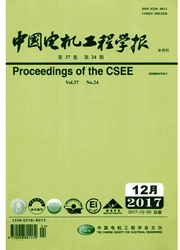

 中文摘要:
中文摘要:
选择电力消费为被解释变量,固定资产投资、人均可支配收入、出口和电力价格水平为解释变量,以1980-2004年的实际数据为样本,对变量进行协整分析,建立的协整模型揭示了我国电力消费与解释变量之间存在长期协整关系,同时该模型反映了解释变量对电力消费的影响机理和影响程度。Granger检验表明电力消费与解释变量之间存在单向的Granger因果关系。向量误差修正模型中的误差调整项显著且其系数为负,说明具有将系统的短期波动调整到长期均衡的机制。通过对向量误差修正模型(vector error correction model,VECM)进行脉冲分析,固定资产投资、人均可支配收入和出口对电力消费具有持续的正影响,而电力价格对电力消费具有持续的负影响。分析结果对电力消费预测和电力政策制定具有一定的参考。
 英文摘要:
英文摘要:
By undertaking a cointegration analysis with annual data over the period 1980--2004 in China, the estimation results show that there is a cointegration relationship between electricity consumption and the explanatory variables, which are fixed asset investment, disposal income per capita, export and electricity price. Granger causality tests show that there are unidirectional Granger causalities between electricity consumption and the explanatory variables. The error correction term of the vector error correction model (VECM) is significant, and its coefficient has the expected negative sign, which implies that it indeed reflects an error correction mechanism that tends to bring the system closer to its long-run equilibrium. Impulse responses of the VECM show that fixed asset investment, disposal income per capita and export permanently affect the electricity consumption in a positive way, but electricity price permanently affects electricity consumption in a negative way. The results are quite robust and can be used for forecasts and policy analyses.
 同期刊论文项目
同期刊论文项目
 同项目期刊论文
同项目期刊论文
 期刊信息
期刊信息
